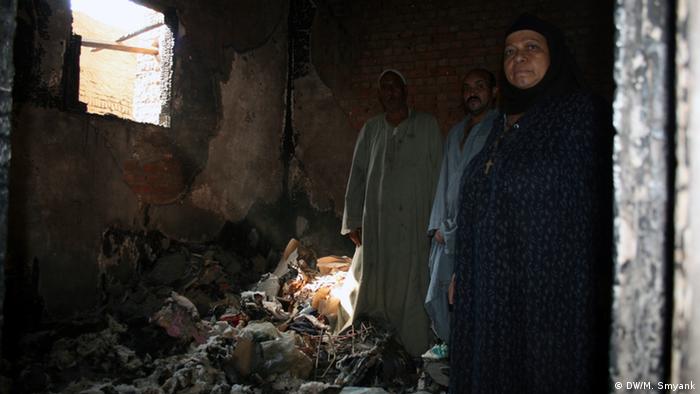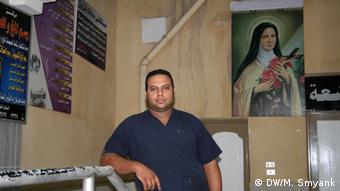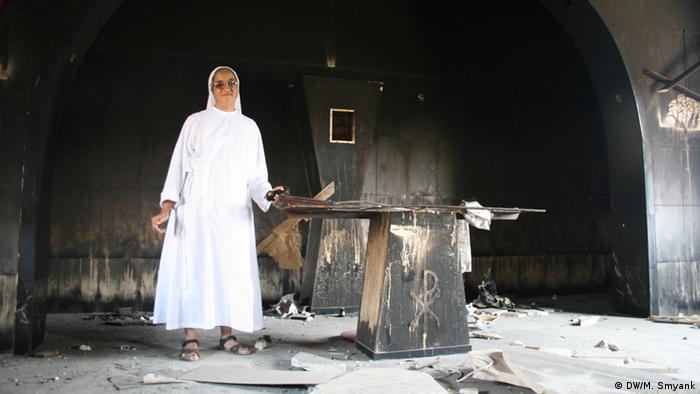_Logo_2012.png)
Persecuted and forgotten: Egypt's Christians
Anti-Christian violence is on the rise in Egypt. Just a month ago, 45 churches and buildings were burned to the ground. But will Egyptian security forces do anything to stop it?
Charred benches, notebooks covered in ash, the burned-out shell of a schoolbus. The Franciscan school in the upper Egyptian city of Beni Suef looks like the aftermath of a bomb attack. Toilets and sinks are shattered into fragments. The melted blades of fans hang from the ceiling.
Bedecked in white, sister Nagaat sits beside the wreckage of an altar in a room with blackened walls. Christian services can no longer be held here. The attackers took stools, sacred images - even light switches and cables. They burned the cross on top of the building, and raised the flag of al-Qaeda in its place. "The Islamists wreaked havoc for eight hours," says Nagaat and picks up the head of a Virgin Mary statue from the floor.
Increasing attacks
One month after the most intense religious unrest in Egypt since the revolution of January 25, 2011, the country's Christian communities remain in shock. At least 45 churches and many other Christian facilities went up in flames on August 14. The fiercest violence raged in upper Egypt, where the number of Christians is particularly high. The attacks are thought to be retaliation for the Egyptian army's massacre of hundreds of Islamists at a Cairo protest, when the Muslim Brotherhood accused Christians of supporting the military.
 Memories lost: a Christian family in the town of Diabija laments the destruction of their home
Memories lost: a Christian family in the town of Diabija laments the destruction of their home
Egyptian Christians have seen themselves as the victims of discrimination for decades - professionally and in day-to-day life. But in the past few months, the number of violent attacks against them has risen markedly. Nagaat blames the fallen Islamist government of President Mohammed Morsi.
"President Hosni Mubarak put the preachers of hate behind bars," she told DW. "Under Morsi, though, they were allowed to agitate in the mosques as much as they wanted to." Thus, she says, the imams called for the boycott of Coptic stores in Beni Suef.
Police overwhelmed
Security forces have arrested more than 2,000 Morsi supporters since August 14, yet the situation has improved little for Christians. In Dalga, a small city in the upper Egyptian province of El Minja, Islamists recently called for the establishment of Sharia law, and 40 Christian families fled the area after arsonists torched their homes. Meanwhile, Christians remaining in Dalga have to pay protection money to Islamists.
In Beni Suef, members of the Muslim Brotherhood march nearly every evening through the city center threatening further attacks, says Amir Samy, a doctor at St Theresa hospital. Yet police have not complied with requests to place guards in front of the Christian hospital there.
Samy isn't angry, though. "The police can hardly protect themselves," he told DW. On the same day the Franciscan school went up in flames, Islamists also set fire to a central police station.
Samy has treated a number of policemen with bullet wounds. For one of the officers, help came too late - he was a 22-year-old Christian, and a friend of the doctor's.
 At his own risk, doctor Amir Samy has helped many wounded police officers at his Christian hospital
At his own risk, doctor Amir Samy has helped many wounded police officers at his Christian hospital
Old hatreds
Many Coptic Christians in Egypt place their hopes in the army, even though the military killed Christian demonstrators in Cairo little more than two years ago. Last month, Defense Minister Abdel Fattah el-Sissi promised Christians that the army would pay for the restoration of destroyed churches, but little has happened so far.
"No one from the government has even seen the damage," says Sarif Nasser, a hairdresser from a small town founded by Christians just south of Beni Suef. One local church is now nothing but burned-out ruins, and the resident priest has fled.
"Hatred towards Christians has been around for a long time," he told DW. "But only since Morsi have they been acting on it."
Nasser was able to identify many of the attackers as members of the Muslim Brotherhood, while others, he says, were paid accomplices. The police initially arrested some of them, but they escaped the next day when a group of Islamists set the police station on fire.
Faltering progress
In Beni Seuf, processing the crimes is a sluggish business. The Franciscan school sent discs to authorities with photos and videos of the attacks recorded by neighbors. Dozens of plunderers can be seen in them, some laughing joyfully at the cameras.
But local Christians say that few people have been arrested, despite this evidence. Nagaat is also disappointed by the lack of help from the local community. For her, that is the most difficult thing to understand, since two-thirds of her 600 students are Muslim.
Some Muslims in neighboring areas have expressed regret at the fire, she says, but when it comes to rebuilding the church, no one wants to help.
DW.DE



